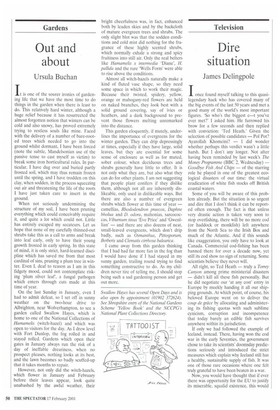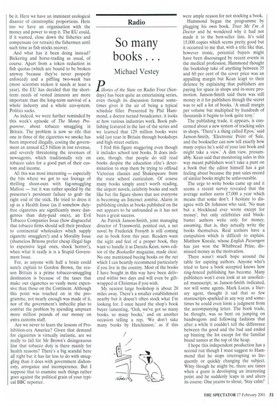Dire situation
James Delingpole Ionce found myself talking to this quasilegendary hack who has covered many of the big events of the last 50 years and met a good many of the world's most important figures. 'So who's the biggest c—t you've ever met?' I asked him, He furrowed his brow for a few seconds and then replied with conviction: 'Ted Heath.' Given the selection of possible candidates — Pol Pot? Ayatollah Khomeini? — I did wonder whether perhaps this verdict wasn't a little harsh, But I don't any longer. Not after having been reminded by last week's The Money Programme (BBC 2. Wednesday) — Goodbye Fish And Chips — of the starring role he played in one of the greatest ecological disasters of our time: the virtual eradication of white fish stocks off British coastal waters.
Some of you will be aware of this problem already. But the situation is so urgent and dire that I don't think it can be reported often enough. The fact is that unless very drastic action is taken very soon to stop overfishing, there will be no more cod (or haddock or monkfish) left anywhere from the North Sea to the Irish Box and much of the Atlantic, And if this sounds like exaggeration, you only have to look at Canada. Commercial cod-fishing has been banned there for over a decade now, yet still its cod show no sign of returning. Some scientists believe they never will.
All right, so Ted Heath — truly a Torrey Canyon among prime ministerial disasters — didn't kill all these fish personally. But he did negotiate our 'at any cost' entry in Europe by meekly handing it all our shipping grounds. At which point, of course, his beloved Europe went on to deliver the coup de grace by allocating and administering its fishing quotas with such sublime cynicism, corruption and incompetence that today barely an edible fish survives anywhere within its jurisdiction.
If only we had followed the example of Iceland, instead. There, having won the cod war in the early Seventies, the government chose to take its scientists' doomsday predictions seriously and introduced the strict measures which explain why Iceland still has a healthy, sustainable supply of fish, It was one of those rare occasions where one felt truly grateful to have been beaten in a war.
Now, you would have thought that if ever there was opportunity for the EU to justify its miserable, squalid existence, this would be it. Here we have an imminent ecological disaster of catastrophic proportions. Here too we have an organisation with the money and power to stop it. The EU could, if it wanted, close down the fisheries and compensate (or retrain) the fishermen until such time as fish stocks recover.
And what has it been doing instead? Bickering and horse-trading as usual, of course. Apart from a token reduction in fish quotas (which are bound to be broken anyway because they're never properly enforced) and a piffling two-week ban (most scientists reckon it needs at least a year), the EU has decided that the shortterm needs of vested interests are more important than the long-term survival of a whole industry and a whole eco-system. Politics sucks.
As indeed, we were further reminded by this week's episode of The Money Programme, about tobacco smuggling in Britain. The problem is now so rife that one in three of the cigarettes we smoke has been imported illegally, costing the government an annual £2.5 billion in lost revenue, and severely threatening the revenues of newsagents, which traditionally rely on tobacco sales for a good part of their custom and income.
All this was most interesting — especially the bits where we got to see footage of thrilling shoot-outs with fag-smuggling Mafiosi — but it was rather spoiled by the presenter's persistent failure to grab the right end of the stick. He tried to dress it up as a Health Issue (as if somehow dutyfree cigarettes are significantly more dangerous than duty-paid ones), an Evil Tobacco Companies Issue (how disgraceful that tobacco firms should sell their produce to continental wholesalers which supply cigarette smugglers!) and a Morality Issue (shameless Britons prefer cheap illegal fags to expensive legal ones, shock horror!), when what it really is is a Stupid Government Issue.
For, as anyone with half a brain could surely explain to Gordon Brown, the reason Britain is a prime tobacco-smuggling destination is because of the taxes that make our cigarettes so vastly more expensive than those on the Continent. Although this point was touched on in the programme, not nearly enough was made of it, nor of the government's imbecilic plan to combat the problem by spending umpteen more million pounds of our money on extra customs staff.
Are we never to learn the lessons of Prohibition-era America? Given that demand for cigarettes is virtually inelastic, are we really to fall for Mr Brown's disingenuous line that tobacco duty is there mainly for health reasons? There's a big scandal here all right but it has far less to do with smuggling than it does with government dishonesty, arrogance and incompetence. But I suppose that to examine such things rather goes against the political grain of your typical BBC reporter.



































































 Previous page
Previous page